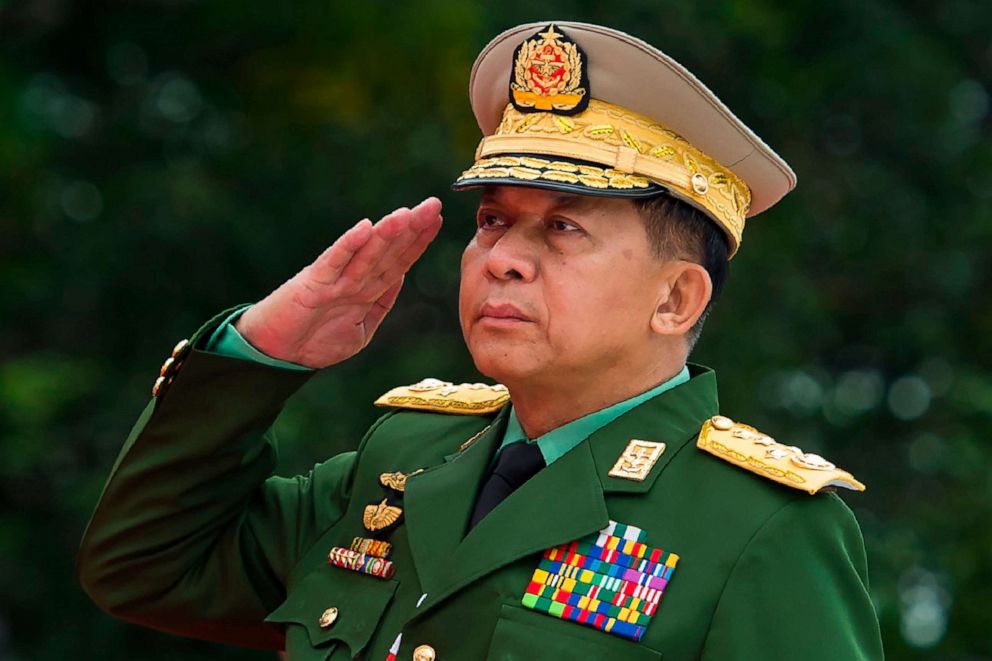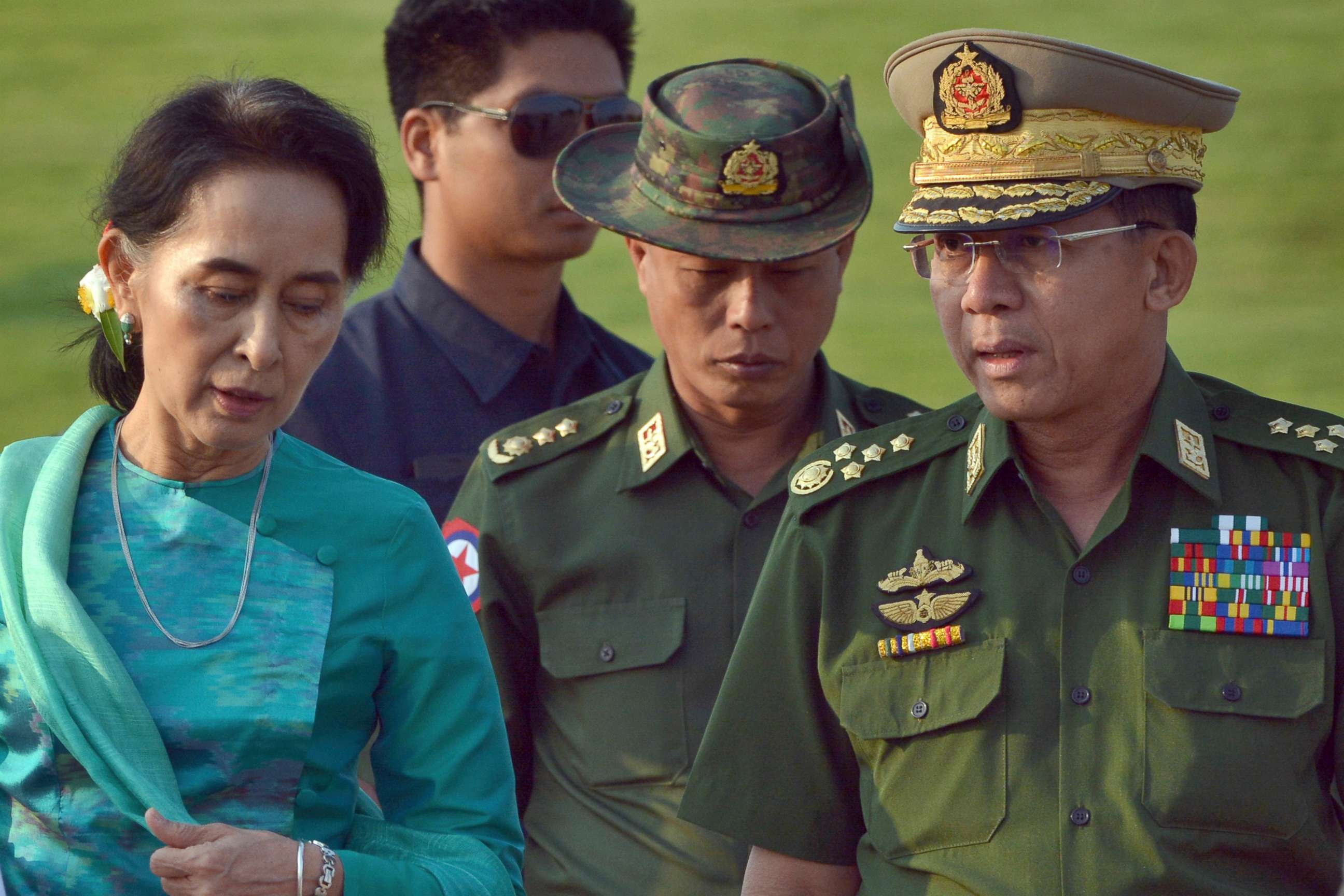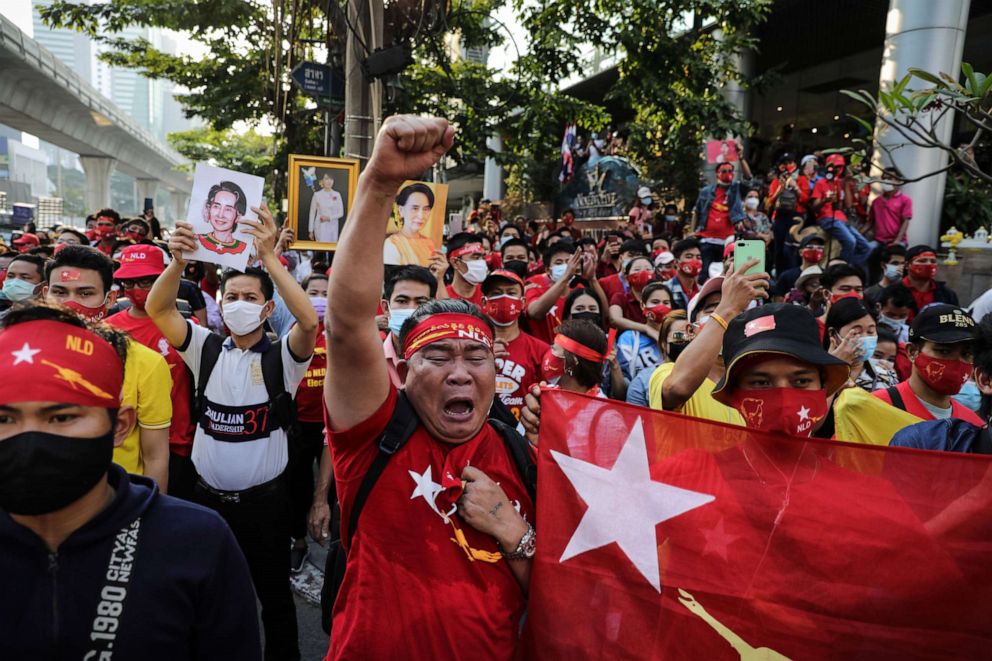Myanmar army seizes power in apparent coup, declares state of emergency
Aung San Suu Kyi along with members of her party were detained by the military.
HONG KONG -- Myanmar’s army seized power in an apparent coup during the early morning hours Monday, detaining de facto leader Aung San Suu Kyi along with members of her party and declaring a state of emergency, which signaled an end to the Southeast Asian nation's nascent democratic experiment.
A newsreader on the military-owned Myawaddy TV confirmed the coup hours later, citing widespread voter fraud in the country's general elections this past November, which Suu Kyi’s party National League for Democracy (NLD) won in a landslide. The newsreader said Senior Gen. Min Aung Hlaing, commander-in-chief of Myanmar's armed forces, would be in charge of the country while Vice President Myint Swe, a retired general and close ally of Myanmar's former junta leader, would be elevated to acting president.
The NLD published a statement on behalf of Suu Kyi, saying people should protest the military coup
"The actions of the military are actions to put the country back under a dictatorship," the statement read. "I urge people not to accept this, to respond and wholeheartedly to protest against the coup by the military."

Suu Kyi, a Nobel laureate who is still revered in her country despite losing some of her international luster for her refusal to condemn the Myanmar army’s atrocities against the Rohingya Muslim minority, is understood to have had a tentative shared power agreement with the military since she was named state counsellor in 2016, offering the government a veneer of democratic legitimacy as they embarked on a decade of reforms. The role of state counsellor, akin to a prime minister or a head of government, was created because Myanmar's 2008 constitution barred Suu Kyi from becoming president, since her late husband and children are foreign citizens.
The Nov. 8 election was meant to be a referendum on Suu Kyi’s popular civilian government but her party expanded their seats in Parliament, securing a clear majority and threatening the military's tight hold on power. The constitution guarantees the military 25% of seats in Parliament and control of several key ministries.
The new civilian-led government was supposed to convene for the first time on Monday but power has now been handed over to Hlaing, who is already under U.S. sanctions for his role in the human rights abuses against the Rohingyas.
An order signed by the acting president granted full authority to Hlaing to run the country due to the alleged voter fraud and declared a state of emergency that will last for at least one year. Hlaing’s office said in a statement that the military would hold a "free and fair general election" after the state of emergency ends. Voter rolls will be checked and the country's election commission, which last week rejected the military's allegations of voter fraud, will be "re-established," according to the statement.

Myanmar, formerly known as Burma, was previously ruled by the military for nearly five decades before appearing to slowly transition to democratic rule a decade ago and holding its first general elections in years in 2015, which was also a landslide victory for the NLD. Suu Kyi had spent 15 years under house arrest while leading the struggle for democracy against the Burmese military junta and was awarded the 1991 Nobel Peace Prize for her "nonviolent" efforts.
NLD spokesman Myo Nyunt confirmed to Reuters that Suu Kyi, Myanmar President Win Myint and other NLD leaders were “taken” in the early hours of the morning, adding that he expected to be arrested himself. Reuters reported that it subsequently was unable to contact him.
The state-run Myanmar Radio and Television (MRTV) announced on its social media page that it was no longer working on Monday morning. There were also reports of phones and internet being cut in the capital of Nay Pyi Taw and in some parts of the commercial center of Yangon.
In a statement issued late Sunday, U.S. Secretary of State Antony Blinken said Myanmar's military "must reverse these actions immediately."
"We call on Burmese military leaders to release all government officials and civil society leaders and respect the will of the people of Burma as expressed in democratic elections on November 8," Blinken added. "The United States stands with the people of Burma in their aspirations for democracy, freedom, peace, and development."
The U.S. embassy in Myanmar has urged U.S. citizens there to "avoid unnecessary travel, monitor local media, and avoid large gatherings."

Signs of an impending coup were building in recent weeks as a military spokesperson said on Jan. 26 that he did not rule out the possibility of a coup when asked about it at a media conference. The next day, Hlaing said in a speech at a military academy that "if the constitution is not followed, then it should be declared invalid."
A report by Japanese newspaper Nikkei, which cited military sources, said Myanmar's military and Suu Kyi's government held talks in Nay Pyi Taw as late as Jan. 28 in an attempt to reach common ground but ultimately failed to come to an agreement.
Local reports said the military expressed concerns about the electoral commission and demanded a recount of the votes as well as a postponement of Monday’s opening of Parliament, but Suu Kyi’s government refused.
Myanmar historian and celebrated author Thant Myin-U on Monday warned of an ominous near future for his home via Twitter: "The doors just opened to a very different future. I have a sinking feeling that no one will really be able to control what comes next. And remember Myanmar’s a country awash in weapons, with deep divisions across ethnic and religious lines, where millions can barely feed themselves."
ABC News' Morgan Winsor contributed to this report.




